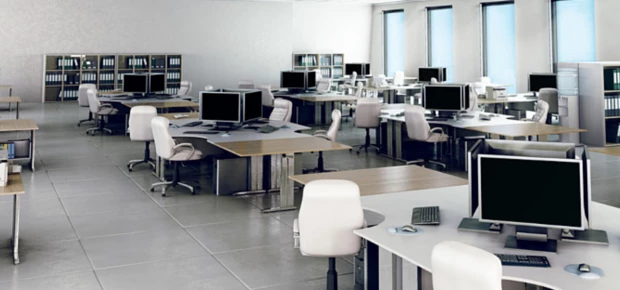
Partner Article
Demand for fixed office space will die out by 2035
As technology continues to advance, a business expert has predicted that the UK’s office property sector, worth £2bn per annum to the economy, will fundamentally change in just 20 years.
With the growth of cloud-based services and mobile devices, people no longer need a permanent desk and will increasingly work from home or utilise pay-as-you-use alternatives, says unified communications expert Tim Meredith from Daisy Group.
Cost savings
He explained: “The business world has become extremely fast-paced and organisations need to be able to react quickly to survive. Office space, on the other hand, requires long-term financial commitment and maximum occupancy, otherwise it becomes a huge financial drain.
“Floor space is one of the biggest outgoings for the majority of businesses and yet it is largely becoming an unnecessary expense. The nine-to-five shift is dying as more businesses allow their employees to work flexibly, which means workers no longer need to be desk-bound and there is less need for fixed office space.
“The number of UK home workers has increased by 45% since the start of the millennium, and I anticipate this trend to continue. By 2035, businesses will be following the lead of freelancers and start-ups by renting fully-equipped office space or portable workstations as and when they need them. Both options are increasingly attractive because they cut real estate costs, office overheads and travel expenses.
“The mass availability of affordable tools, like video conferencing software, internal social networks and intranets, are enabling businesses to create virtual teams around the country that can collaborate, and I can only see flexible working and the trend of pay-as-you-use desk space and meeting room provision growing.”
Remote working
The rollout of superfast broadband and 4G connectivity across the UK is also helping facilitate the move away from the office. Increasingly, workers are able to access software and applications that were traditionally only available at the office, from their homes, via VPNs and the cloud.
Alongside the number of UK people working from home reaching more than 4 million, technical ‘mobile device management’ solutions have been developed to enable organisations to monitor their remote workers’ activity.
Tim Meredith advised: “Removing permanent offices means businesses have to create processes and implement tools, such as cloud-based productivity apps, to monitor worker performance. A large proportion of employees will actually enjoy the freedom afforded to them and this will lead to improved morale and output.
“Whilst the office may disappear, communication and physical interaction with colleagues in close proximity will still be necessary. Organisations must ensure that staff attend regular meetings with their peers and always have the opportunity to use office facilities if needed – which is where rented or shared office spaces become viable options.”
An example to follow?
One organisation that is already working without a fixed office isNozbe, a fast-growing app development company which serves business professionals. The firm encourages its 18 employees to collaborate by sharing files via Dropbox; communicate via instant messaging service, Slack; and use Skype when they require face-to-face interaction. In order to build team spirt, the business organises two employee meetings per year at an agreed hired venue.
Michael Siliwinski, Founder of Nozbe, explained the business rationale: “Offices are incredibly distracting places to work at, but at Nozbe we are able to start early and take breaks when we want, ensuring maximum productivity. However, it is important that we have the right communication channels in place so that everyone is aligned and has a common understanding of team activities and needs. Despite the fact we all work from home, we actually feel more connected than most workforces that operate using traditional offices.”
’No brainer’
Tim Meredith advised that the savings associated with removing fixed property costs is a ‘no brainer’ for businesses as they look to improve performance.
He added: “Eliminating fixed office space means businesses can become more agile and, most importantly, save thousands of pounds which can be reinvested for their staff and customers. The next generation of workers are digital natives and at ease using the technologies available, so it really is a no-brainer to let them work remotely.”
This was posted in Bdaily's Members' News section by Andrew Frost .
Enjoy the read? Get Bdaily delivered.
Sign up to receive our popular morning National email for free.








 Raising the bar to boost North East growth
Raising the bar to boost North East growth
 Navigating the messy middle of business growth
Navigating the messy middle of business growth
 We must make it easier to hire young people
We must make it easier to hire young people
 Why community-based care is key to NHS' future
Why community-based care is key to NHS' future
 Culture, confidence and creativity in the North East
Culture, confidence and creativity in the North East
 Putting in the groundwork to boost skills
Putting in the groundwork to boost skills
 £100,000 milestone drives forward STEM work
£100,000 milestone drives forward STEM work
 Restoring confidence for the economic road ahead
Restoring confidence for the economic road ahead
 Ready to scale? Buy-and-build offers opportunity
Ready to scale? Buy-and-build offers opportunity
 When will our regional economy grow?
When will our regional economy grow?
 Creating a thriving North East construction sector
Creating a thriving North East construction sector
 Why investors are still backing the North East
Why investors are still backing the North East